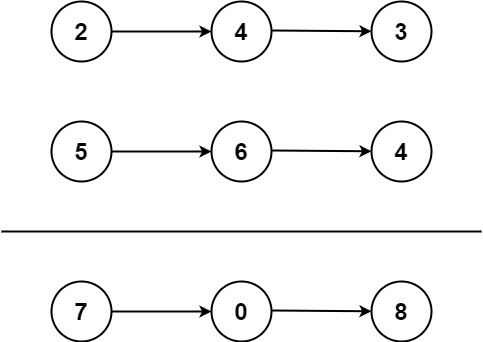
Leetcode problem 2 Solution using Python - Add Two Numbers
Here is solution of leetcode problem 2 using Python
Problem
You are given two non-empty linked lists representing two non-negative integers. The digits are stored in reverse order, and each of their nodes contains a single digit. Add the two numbers and return the sum as a linked list.
You may assume the two numbers do not contain any leading zero, except the number 0 itself.
Example 1

Input: l1 = [2,4,3], l2 = [5,6,4]
Output: [7,0,8]
Explanation: 342 + 465 = 807.
Example 2
Input: l1 = [0], l2 = [0]
Output: [0]
Example 3
Input: l1 = [9,9,9,9,9,9,9], l2 = [9,9,9,9]
Output: [8,9,9,9,0,0,0,1]
Constraints:
The number of nodes in each linked list is in the range [1, 100].
0 <= Node.val <= 9
It is guaranteed that the list represents a number that does not have leading zeros.
Solution
Inputs are singly-linked lists not normal lists. Let's create the singly-linked list using Python first so you can understand the problem better.
class ListNode:
def __init__(self, val=0, next=None):
self.val = val
self.next = next
l1 = ListNode(0)
l1.next = ListNode(2)
l2 = ListNode(1)
n1 = ListNode(4)
l2.next = n1
n2 = ListNode(5)
n1.next = n2
_ l1 and l2 are single-linked lists. l1 is similar to 0 -> 2 -> None and l2 is similar to 1 -> 4 -> 5 -> None.
_ Here is the solution. You can copy & paste this code to the leetcode.
class Solution:
def addTwoNumbers(self, l1, l2):
new = ListNode(0)
temp = None
carry = 0
while (l1 or l2 or carry):
if l1:
carry = carry + l1.val
l1 = l1.next
if l2:
carry = carry + l2.val
l2 = l2.next
rem = carry % 10
e = ListNode(rem)
if temp:
temp.next = e
else:
new.next = e
temp = e
carry = carry//10
return new.next
Calling the function - No need to submit this code to the leetcode. This is only for our understanding.
class ListNode:
def __init__(self, val=0, next=None):
self.val = val
self.next = next
def __str__(self):
s1 = ""
while self:
s1 = s1 + str(self.val) + "->"
self = self.next
return s1
l1 = ListNode(0)
l1.next = ListNode(2)
print(l1)
l2 = ListNode(1)
n1 = ListNode(4)
l2.next = n1
n2 = ListNode(5)
n1.next = n2
print(l2)
s = Solution()
l3 = s.addTwoNumbers(l1,l2)
print(l3)
Outcome
0->2->
1->4->5->
1->6->5->
Thanks for reading the article. Keep learning
